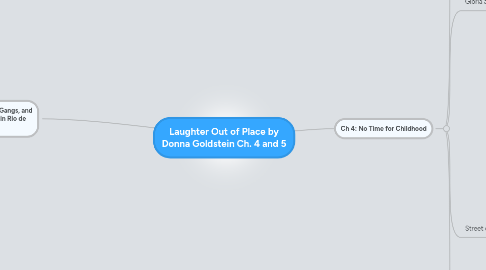
1. Ch 4: No Time for Childhood
1.1. Pedro Paulo (Gloria's 1st born)
1.1.1. Absent father cried over death
1.1.1.1. Gloria thought this to be funny
1.1.1.2. Gloria ran out of tears for him before death
1.1.2. involved in gang (Red Command)
1.1.2.1. lead to early death
1.1.2.2. time in prison
1.1.2.3. no regret
1.1.2.4. did not believe lower class "honest" work could support a family
1.1.3. Intelligent
1.1.3.1. always had much to say
1.1.3.2. had some understanding of politics and the absurd nature of poverty in Rio pg. 140
1.1.3.3. Angry cause of life's circumstances
1.1.4. Believed in female double standards
1.1.4.1. supported by gang
1.1.4.2. his "girl" could not have an abortion
1.1.4.2.1. needs to take responsibility of having sex
1.1.4.3. men could have multiple partners, women could not
1.1.4.4. men needed to provide for family
1.1.4.4.1. tried to with his boy till his death
1.2. Gloria as a parent
1.2.1. tough
1.2.1.1. reputation could scared hardened criminals
1.2.1.2. discouraging children from getting in trouble
1.2.1.3. kicked out 2 of her her own daughters to the streets
1.2.1.4. strict
1.2.1.5. cruel and unusual punishments
1.2.2. didn't want children on streets or in gangs
1.2.2.1. felt like she failed Pedro Paulo
1.2.3. distrusted FUNABEM
1.2.3.1. believed it to be training ground for young criminals pg. 146
1.2.4. wanted children to be in school
1.2.4.1. worked hard to provide them with school uniforms
1.2.5. Generous with few resources she had pg. 159
1.2.6. teach children how to survive
1.3. Street children
1.3.1. see wealthy children with nice things
1.3.1.1. nurtured (rich) vs nurturing (poor) children
1.3.2. shot by death squads
1.3.2.1. seen as future criminals
1.3.3. Pixote
1.3.3.1. film about street children
1.3.3.2. showed violence they face in the streets and cruelty of institutions that house children pg. 147
1.3.3.3. created not only sympathy for these children but fear too
1.3.4. often used by gangs to do dirty work
1.3.4.1. get less punishment
1.3.5. seen as nuisances to upper and middle classes
1.3.6. gangs help protect
1.4. Children taken in by Gloria
1.4.1. Mirelli
1.4.1.1. parents alcoholics
1.4.1.1.1. mom died at 6, dad couldn't take care of her
1.4.1.2. feel as though never had a childhood
1.4.1.2.1. spent many nights on the streets
1.4.1.3. stayed in FUNABEM
1.4.1.3.1. crowded and dirty
1.4.1.3.2. abused sexually
1.4.1.4. happy ending
1.4.1.4.1. had children and long term partner
1.4.2. Lucas
1.4.2.1. Celina's son
1.4.2.1.1. Gloria is his aunt
1.4.2.2. lived in extreme poverty
1.4.2.2.1. unrecognizable so skinny
1.4.2.3. saved by Gloria
1.4.2.4. didn't care for school
1.4.2.4.1. worked fo car mechanic
1.4.2.5. joined gang
1.4.2.5.1. looked up to Pedro Paulo
1.4.3. Aguinaldo and Emilio
1.4.3.1. Zezinho's children (Gloria's ex-partner)
1.4.3.1.1. lived with her after break up
1.4.3.1.2. Gloria mothered them
1.4.3.2. looked like "street kids"
1.4.3.3. helped make money for Zezinho
1.4.3.3.1. "nurturing children"
1.4.3.4. Emilio joined a gang
1.4.4. Marta
1.4.4.1. last of Celina's children to be taken in
1.4.4.2. found as street child
1.4.4.2.1. hard to change her street life mentality
2. Ch 5: State Terror, Gangs, and Everyday Violence in Rio de Janeiro
2.1. Violence
2.1.1. "law of silence"
2.1.1.1. keep authorities out
2.1.1.1.1. police violent too
2.1.2. upper/ middle class gossip about it
2.1.2.1. have security guards
2.1.2.2. less extreme violence seen compared to poorest class
2.1.3. waves of violence
2.1.3.1. times with stable reasonable leader less crime
2.1.3.2. times with power struggles in gangs much more crime
2.1.4. favelas runned by gangs
2.1.5. men more likely to experience violence
2.1.5.1. commonly murdered
2.2. Gangs
2.2.1. seen as important to many residence in poor areas
2.2.1.1. protect from other gangs
2.2.1.2. will works with police
2.2.1.3. will stop fights
2.2.1.4. feels as though they keep the peace
2.2.2. Appeal
2.2.2.1. children don't want to slave away like parents
2.2.2.2. provides decent wages
2.2.2.3. gives children sense of identify and belonging
2.2.2.3.1. makes boys feel more masculine
2.2.2.3.2. many boys like having a gun
2.2.3. problems with drugs
